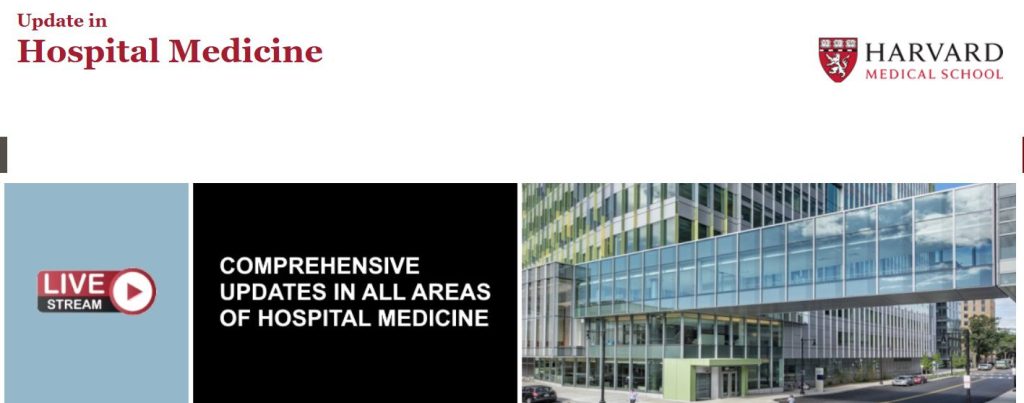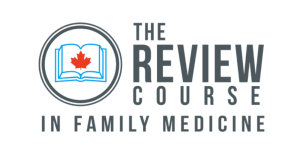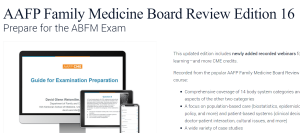This is the highlights list from the 2024 course.
ALLERGY/IMMUNOLOGY
- What to do when there is no allergist
- How to resolve inappropriate low-risk penicillin allergy labels
- Updates in anaphylaxis management
- Things we do for no reason: steroids for anaphylaxis?
- Class action: sorting out the overlap between penicillin and cephalosporins
CARDIOVASCULAR
- Less is more in the long run? DAPT vs. monotherapy in ACS
- End of an era? Beta-blockers after acute MI
- Coronary CTA: as good as cardiac catheterization?
- How low should you go? Hemoglobin targets in acute coronary syndromes
- State-of-the-art management of systolic and diastolic heart failure
- Titration of GDMT: are we being too wimpy?
- More data to support GLP-1 receptor agonists for obesity-related HFpEF
- Overcoming diuretic resistance in heart failure
- Reducing readmissions for heart failure: best practices in discharge planning
- Updated guidelines on atrial fibrillation management
- Avoiding common pitfalls of anticoagulation in atrial fibrillation
- Rhythm control versus rate control for atrial fibrillation revisited
- The jury is out: anticoagulation in silent atrial fibrillation with a low CHA2DS2-VASc
- Drug-drug interactions: DOACs and diltiazem
- Should you switch anticoagulants in patients with breakthrough strokes?
DERMATOLOGY
- Cellulitis: antibiotic dilemmas and when to call dermatology
- New data on optimal treatment duration for skin and soft tissue infections
- DRESSed to kill: drug reactions and other can’t-miss dermatology diagnoses
- Cutaneous findings of systemic disease
- Differentiating skin infections and mimics in hospitalized patients
- Cellulitis or venous stasis? Demystifying the swollen red leg
- A cautionary tale: antibiotics with high risk of dermatologic reactions
DIAGNOSTICS
- Can’t-miss ECG diagnoses
- Radiology pearls: identifying subtle findings on CXR
- Rapid-fire review of electrolyte, liver, and hematology cases
- Contrast or no contrast? Choosing the right imaging protocols
ENDOCRINE
- Dangers of SGLT2 inhibitors: euglycemic DKA and UTIs
- GLP-1 agonists for weight loss: hot takes for the hospitalist
- Challenging cases in inpatient insulin management
- Continuous glucose monitoring in hospitalized patients with diabetes
- New guidelines for the management of hyperglycemia in the hospital
- Adrenal insufficiency: whom to treat and how to taper steroids
- Pitfalls in managing thyroid disease in medically ill patients
- Practical approach to adrenal incidentalomas
- When to worry about pheochromocytoma
EQUITY
- Anti-racism in hospital medicine, from triage to care transitions
- Providing top-notch inpatient care to patients with obesity
- Trauma-informed care in the hospital
- Inequities in organ transplantation in the US
- Race-based reference ranges: end of an error
- Racial equity and pain management in the hospital
- Improving patient outcomes with interpreter services
GASTROINTESTINAL
- Covert hepatic encephalopathy: more common than you think
- Evolving strategies for hepatorenal syndrome: terlipressin
- New guidelines for spontaneous bacterial peritonitis management and prophylaxis
- Managing the cirrhotic patient with bleeding and thrombosis
- Updates on management of upper and lower GI bleeds
- Optimal timing of endoscopy in upper GI bleeds
- New risk scores to help manage patients with upper GI bleeds
- Too soon? When to resume anticoagulation and antiplatelet agents after a GI bleed
- Fluid resuscitation in acute pancreatitis: less is more
- Optimal timing for intra-abdominal drainage in necrotizing pancreatitis
- Urgent and non-urgent indications for ERCP
- Current approaches to preventing post-ERCP pancreatitis
GERIATRICS
- Preoperative frailty assessment in older adults
- Delirium: an ounce of prevention is worth a pound of cure
- Non-pharmacologic interventions for delirium prevention
- Difficult cases in delirium management
- Best practices in pharmacotherapy for agitated delirium
- Greater caution with antipsychotics in dementia
- Less is more: polypharmacy and deprescribing in older patients
HEMATOLOGY
- Management of patients with bleeding and thrombosis
- Diagnosis and management of hypercoagulable states
- Pearls for the diagnosis and management of thrombocytopenia
- Diagnostic approach to anemia in the hospital
- Transfusion thresholds in the hospital: how low should you go?
- Updated venous thromboembolism guidelines
- Is it ever OK to stop anticoagulation in unprovoked venous thrombosis?
- What’s in a name: should we use “provoked” vs. “unprovoked” VTE?
- Do they really need admission? Identifying the low-risk PE patient
- Are DOACs the preferred anticoagulant in patients with cancer?
- More data on DOACs in patients with obesity and chronic kidney disease
INFECTIOUS DISEASES
- Comprehensive review of inpatient antibiotic therapy
- Short-course antibiotics for common infections
- The debate continues: cefepime vs. piperacillin-tazobactam for sepsis
- Piperacillin-tazobactam and acute kidney injury: overblown?
- Injectable therapy for HIV
- Who should we screen for HIV in the inpatient setting?
- Mirror, mirror, on the wall, what’s the least “C-diffy” antibiotic of all?
- Does vancomycin still work against C. difficile?
- Oral fecal microbiota therapy: new first-line for C. difficile?
- Fidaxomicin for C difficile: is it worth the expense?
- Eliminate multidrug-resistant infections with this one weird trick
- Controversies in the management of bacteremia
- When should we consult ID for bacteremia?
- Err on the side of caution: when to switch from IV to PO therapy in bacteremia
- Breakthroughs in MRSA therapeutics
- When should we cover for MRSA pneumonia?
- New treatment options for complicated UTIs
PALLIATIVE CARE
- Evidence-based strategies for serious illness conversations in the hospital
- Which patients benefit most from palliative care?
- Best practices for leading family meetings
PERIOPERATIVE MEDICINE
- Updates on perioperative aspirin, statins, beta blockers, and ACE inhibitors
- To hold or not to hold: understanding the latest on perioperative medication management
- GLP-1 management in perioperative settings
- The importance of frailty in assessing perioperative risk
- Reducing pulmonary risk in perioperative patients
- Perioperative anticoagulation: when should patients be bridged?
PREGNANCY
- Best practices for hypertension management in pregnancy
- Benefits, risks, and contraindications to radiologic studies in pregnant patients
- HELLP me: managing medical complications in pregnant and postpartum patients
- Periprocedural management of pregnant patients
- Treatment guidelines for UTI in pregnancy
PSYCHIATRY
- Pearls for managing patients with personality disorders in the hospital
- Inpatient management of psychiatric medications
- Diagnostic yield of neuroimaging for common psychiatric presentations
- Capacity assessment: can this patient make their own decisions?
- Best practices and risk mitigation for patient-directed discharges
PULMONARY/CRITICAL CARE
- Tailored steroid therapy in acute COPD exacerbations
- Practical applications of the 2023 GOLD guidelines
- Short-course antibiotics in COPD exacerbations
- Uses and limitations of cardioselective beta-blockade in COPD exacerbations
- Current recommendations for supplemental and high-flow O2 in critical illness
- New Surviving Sepsis guidelines
- The never-ending story: steroids in sepsis
RENAL
- New kid on the block: cystatin C for GFR
- Preventing the progression of chronic kidney disease: another win for GLP-1 agonists
- Are GLP-1 agonists and SGLT2 inhibitors kidney-saving medications?
- Diagnostic approach to acute kidney injury
- Is acute kidney injury a risk factor for dementia?
- New data: early renal replacement therapy in acute kidney injury
- Dialysis access: what the hospitalist needs to know
- PICC and choose: IV access in ESRD patients
- Ironing it out: managing anemia in ESRD
- Blood pressure management in end-stage renal disease
- Updates on hyperkalemia and hyperphosphatemia management
STROKE
- Approach to imaging in acute stroke syndromes
- Updates on AHA/ASA guidelines for stroke management
- To DAPT or not to DAPT: antiplatelet therapy in stroke and TIA
- Thrombolysis in acute stroke: are we going to need a bigger window?
- New agents for thrombolysis in acute stroke
- Thrombolytics vs. DAPT for mild strokes: weighing the risks and benefits
- Thrombectomy for acute stroke: is it underused?
- Telestroke: an idea whose time has come?
- Staying cryptocurrent on cryptogenic stroke
- Avoiding hemorrhagic transformation in stroke: when is it safe to start anticoagulation?
- Should you switch anticoagulants in patients with breakthrough strokes?
SUBSTANCE USE DISORDERS
- Treating acute and chronic pain in patients with substance use disorders
- Management of complicated alcohol withdrawal
- Updates on phenobarbital for alcohol withdrawal management
- Medication management for alcohol use disorder at discharge
- Microdosing protocols for buprenorphine induction
- Harm reduction: reducing the risk of opiate overdose at discharge
SYNCOPE
- Syncope: when to worry about cardiac causes
- Diagnostic approach to the patient with recurrent syncope
- Evidence-based tools for risk-stratification in syncope
- Orthostatic syncope: does midodrine help?





